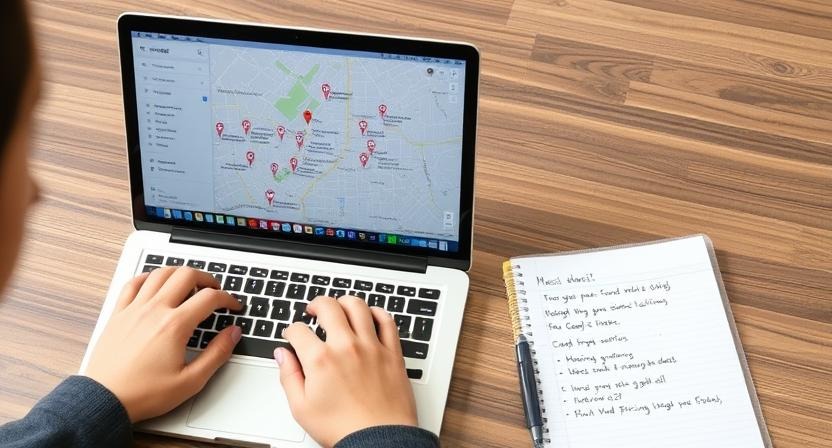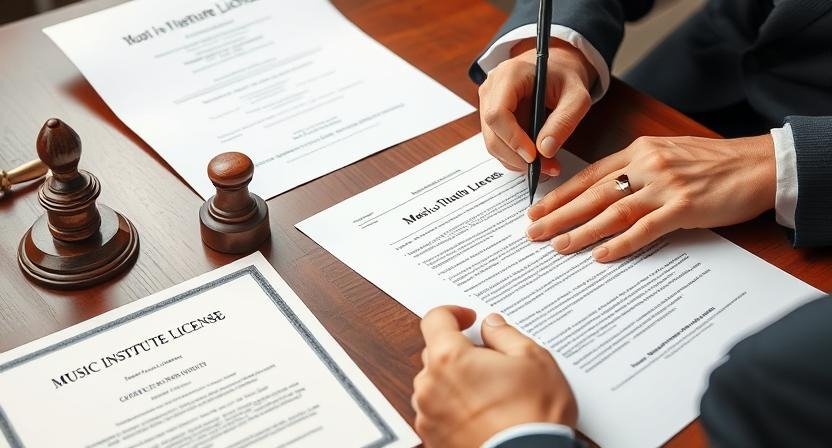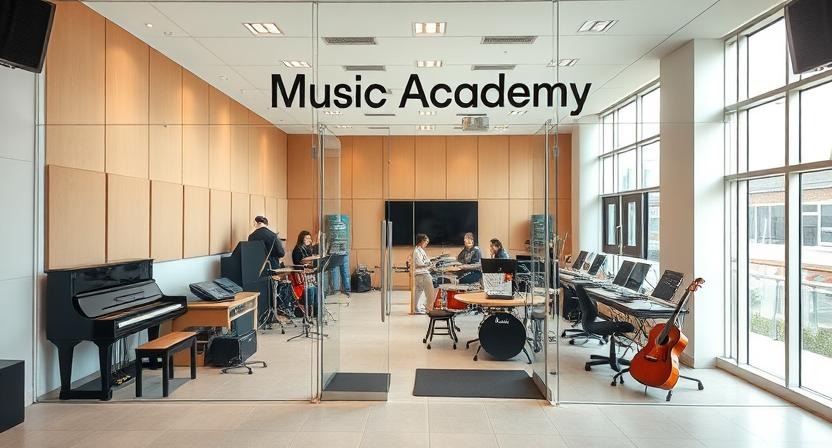A Step-by-Step Guide to Choosing the Perfect Location
Starting a music institute is an exciting venture, but choosing the right space is one of the most critical decisions you will make. The location you select will directly affect student enrolment, teaching quality, and overall success. Many people make mistakes by renting a space based only on cost or convenience without considering important factors like soundproofing, legal permits, accessibility, and future growth potential.
This guide provides a detailed, step-by-step checklist to help you find the perfect rental space for your music academy. If you follow these points carefully, you’ll avoid costly mistakes and create a comfortable, professional, and legally compliant learning environment for your students.
1. Space Requirements: Room Sizes and Soundproofing
Many people assume that any available space can be used for music lessons, but not all spaces are ideal for a music academy. Before signing a rental agreement, check whether the property meets the following requirements:
a) Room Sizes for Different Types of Lessons
- Individual Lessons: Each room should be at least 100-150 square feet to provide enough space for students, teachers, and instruments.
- Group Classes: If you plan to teach multiple students at once, your classroom should be at least 300-500 square feet so students have enough room to sit, move, and practice.
- Practice Rooms: Small soundproof rooms (50-100 square feet) are ideal for students who need private spaces to rehearse.
- Office and Reception Areas: You’ll need extra space for administration, waiting areas, and storage for instruments.
b) Soundproofing to Prevent Noise Disturbance
Music academies generate a lot of noise, which can disturb neighbors, especially in residential or commercial buildings. Make sure your rental space has:
- Thick walls or added insulation to prevent sound leakage.
- Carpeted floors or rubber mats to reduce vibrations.
- Acoustic panels on walls and ceilings to control sound levels inside classrooms.
- Sealed doors and windows to prevent noise from escaping.
👉 Tip: If the space lacks proper soundproofing, ask the landlord for permission to make modifications or negotiate a lower rent to cover these improvements.
2. Nearby Competition Analysis

Many people rent a space without checking the competition, which can make it difficult to attract students. Before finalizing a location, research existing music schools and private tutors in the area.
a) How to Analyze Local Competition
- Search for nearby music academies on Google and social media to see what services they offer.
- Visit their locations in person to observe their student traffic and class sizes.
- Check their pricing models and discounts to understand market expectations.
b) How to Use Competition to Your Advantage
- If many music schools exist, it means there is high demand. But you must offer something unique (e.g., specialized courses, better pricing, superior faculty).
- If few or no music academies exist, the area might lack demand, so you must conduct a local survey before renting a space for your music institute.
3. Public Transport & Parking Availability
Many students and parents will travel to your institute daily, so you need to ensure that reaching your location is easy.
- Is there a nearby bus, train, or metro station?
- Is parking available for students, staff, and visitors?
- Are roads wide enough for easy pickup/drop-off?
If your space doesn’t have dedicated parking, consider:
- Negotiating with nearby businesses to rent parking spots.
- Choosing a location near a public parking lot.
- Setting class schedules to avoid peak traffic hours.
👉 Tip: Parents of young students prefer locations with safe and convenient parking to minimize waiting time.
4. Local Licensing Requirements & Legal Compliance

One of the most common and costly mistakes people make when renting a space for a music institute is ignoring legal requirements. Many enthusiastic entrepreneurs sign lease agreements without verifying whether the space complies with local laws, business regulations, and safety codes. This can lead to heavy fines, legal action, or even forced closure.
To avoid such risks, thoroughly research the legal requirements in your city or state before finalizing the rental. Below are the key factors you should consider:
a) Business Registration & Trade License
Depending on your location, running a music academy may require a business registration or trade license. Some cities allow small private classes without registration, but if you are running a full-fledged music school, you may need to:
- Register your business as a sole proprietorship, partnership, or private limited company.
- Obtain a trade license from the municipal corporation.
- Register for GST (Goods and Services Tax) if your revenue exceeds the threshold set by the government.
👉 Tip: Check with your local municipal office or visit the official government website for business licensing information. If you’re unsure, consult a legal expert to avoid future complications.
b) Zoning Laws & Permitted Business Activities
Not all properties can be used for commercial or educational purposes. Zoning laws dictate what types of businesses can operate in different areas.
- Residential Areas: Some residential areas do not allow commercial activities like running a music school. If allowed, they may have restrictions on class sizes, operating hours, and noise levels.
- Commercial Zones: These are ideal for music academies, as they typically have fewer restrictions on noise and business activities.
- Institutional Zones: Some cities have designated areas for schools and educational institutions, which may offer benefits such as tax exemptions or easier permit approvals.
🔍 How to Check Zoning Laws?
Visit your city’s municipal office or check online portals that provide zoning maps and permitted business activities. You can also ask your landlord for zoning approval documents before signing the lease.
👉 Tip: If you find a perfect location that is restricted for commercial use, you may apply for a zoning change or special permit, but this process can take time and may not always be approved.
c) Fire Safety Compliance
Since music academies accommodate multiple students at a time, you must meet fire safety regulations to ensure their safety. Before renting a space, check for:
- Emergency exits – At least two clearly marked exits should be available.
- Fire extinguishers – These should be placed in classrooms, practice rooms, and near high-risk areas (such as electrical equipment).
- Fire alarms and smoke detectors – Essential for early detection of fire hazards.
- Sprinkler systems – Some commercial buildings require an automatic fire suppression system.
- Proper electrical wiring – Faulty or outdated wiring can cause fire hazards, especially with multiple instruments and amplifiers running at the same time.
👉 Tip: If the property lacks fire safety measures, you may ask the landlord to install them or negotiate a lower rent so you can cover the expenses yourself.
d) Insurance: Protecting Your Business and Equipment
Many people overlook business insurance, but this is crucial to protect your property, musical instruments, and staff. Some landlords require tenants to have insurance before leasing a space.
Types of insurance to consider:
- Public Liability Insurance: Protects you in case a student or visitor gets injured on your premises.
- Property Insurance: Covers damages to the building and rented space.
- Instrument Insurance: If you have expensive instruments, getting them insured will protect you from financial loss in case of theft, fire, or accidental damage.
👉 Tip: Compare insurance plans and choose one that covers all essential risks without unnecessary extras that increase the premium.
e) Building Permits & Renovation Approvals
If you plan to modify the space, such as adding soundproofing, partitions, or signage, you may need a building permit or landlord approval.
- Structural changes (removing walls, adding rooms, installing heavy fixtures) often require government approval.
- Electrical modifications (such as installing extra power sockets for amplifiers and instruments) should be done by a licensed electrician.
- Signage Permits – Some cities have restrictions on the size and placement of business signs, especially in heritage zones or residential areas.
👉 Tip: Discuss all renovation plans with the landlord in advance to avoid legal issues later.
5. Noise Regulations in Residential Areas
Music classes naturally generate a lot of noise, which can lead to complaints from neighbors or even legal action if the property is not soundproofed. Before renting a space, research noise regulations in your area.
a) Common Noise Restrictions
Different cities have different noise control laws. Here are some key points to check:
- Allowed noise levels (measured in decibels or dB).
- Permitted hours for loud activities (some areas restrict music-related activities after 8 PM).
- Distance requirements – Some locations require a minimum distance from residential homes, hospitals, or schools.
- Penalties for violations – Fines for excessive noise can be significant, ranging from ₹5,000 to ₹50,000 in some Indian cities.
👉 Tip: Visit the property at different times of the day to check how sound travels in the area. A space that seems quiet in the morning may become noisy in the evening due to nearby businesses or traffic.
b) How to Reduce Noise Complaints
If the property is in a noise-sensitive area, here are some ways to minimize disturbances:
- Use Soundproofing Materials – Install acoustic panels, thick curtains, and carpets to absorb sound.
- Schedule Classes Wisely – Avoid late evening or early morning lessons when neighbors are more likely to be disturbed.
- Limit Outdoor Activities – If you conduct drum or vocal training, keep windows closed or use special practice rooms.
👉 Tip: If noise remains a major issue, consider renting a space in a commercial zone rather than a residential area.
6. Electricity & Backup Power Needs
A reliable electricity supply is essential for running digital pianos, amplifiers, microphones, and online classes. Many people sign lease agreements without checking the power infrastructure, leading to frequent disruptions.
a) Power Supply Considerations
- Check if the property has a stable power connection – Frequent voltage fluctuations can damage equipment.
- Ask the landlord about power backup options – Some buildings have generators or inverters.
- Ensure there are enough power outlets – Music academies require multiple sockets for amplifiers, recording devices, and computers.
b) Backup Power Solutions
If the location experiences frequent power cuts, invest in:
- UPS (Uninterruptible Power Supply) for computers and digital instruments.
- Inverters or Generators for long-term power backup.
- Voltage Stabilizers to protect sensitive instruments from power surges.
👉 Tip: Test the power supply before renting a space by bringing your equipment and running a mock setup.
7. Water Supply and Sanitation Facilities
While it may seem like a minor detail, having a proper water supply and clean sanitation facilities is crucial when renting a space for your music institute. Students, staff, and visitors will need access to restrooms and drinking water, and overlooking this can lead to discomfort and complaints.
a) Availability of Clean Restrooms
Before finalizing the rental, check the following:
- Number of restrooms – A facility with multiple classrooms should have at least one restroom for every 10-15 people.
- Separate facilities for male and female students – This is essential if you have a large student base.
- Maintenance responsibility – Ask the landlord whether they will handle regular cleaning and maintenance or if it will be your responsibility.
👉 Tip: If the restroom is not well-maintained, negotiate with the landlord to improve its condition before signing the lease.
b) Drinking Water Supply
Music classes can be long and physically demanding, especially for students learning wind instruments or singing, which require proper hydration. Ensure the location has:
- A continuous water supply – Avoid properties that face frequent water shortages.
- Water purifiers or dispensers – If not available, check if there’s space to install your own drinking water station.
👉 Tip: Consider setting up a small refreshment area with a water dispenser, tea/coffee machine, or vending machine for added convenience.
8. Lease Terms and Rent Agreement
A well-structured lease agreement is essential to protect your business interests and financial investment. Many music academy owners fail to negotiate lease terms properly, leading to unexpected expenses and legal disputes.
a) Key Clauses to Include in the Lease
When reviewing the rental agreement, make sure it includes:
- Lease duration – A longer lease (3-5 years) provides stability, while a short-term lease (1 year) offers flexibility.
- Rent escalation clause – Some landlords increase rent yearly. Clarify how much the increase will be.
- Maintenance responsibilities – Define who will handle repairs, maintenance, and utility bills.
- Early termination policy – If you decide to shift locations, check whether there’s a penalty for breaking the lease early.
- Subleasing permission – If you plan to rent out a section of your academy to another teacher, ensure subleasing is allowed.
👉 Tip: Hire a legal expert to review the contract before signing, ensuring there are no hidden clauses that could harm your business.
b) Security Deposit & Additional Fees
Landlords often demand a security deposit to cover potential damages. Common deposit requirements include:
- 1 to 6 months’ rent upfront – This varies based on the city and landlord policies.
- Advance payments for utilities – Some properties require a prepayment for electricity, water, or security services.
- Additional maintenance fees – If renting in a shared commercial complex, check for monthly maintenance charges.
👉 Tip: Negotiate to reduce the upfront deposit amount if it seems too high. Some landlords agree to lower deposits in exchange for a longer lease commitment.
9. Flexibility for Future Expansion
As your music academy grows, you may need extra space for more students, additional instructors, or new courses. Choosing a location with expansion potential will save you the hassle of moving later.
a) Check if Adjacent Spaces are Available
- Ask the landlord whether the adjacent rooms or floors could be rented in the future.
- Look for multi-floor buildings where expansion is possible.
- Consider spaces that allow room modifications, such as adding partitions or extra classrooms.
👉 Tip: If expansion isn’t possible, consider renting a larger space than you immediately need, so you don’t outgrow the location too soon.
b) Parking Space for Future Growth
- If your student base increases, will the current parking space be sufficient?
- Check for nearby public parking options if on-site parking is limited.
- Ask about rental agreements for extra parking spots in case you need them later.
👉 Tip: Lack of parking can be a major inconvenience, especially for parents dropping off children or students bringing musical instruments.
10. Community and Local Support
A music academy thrives when it’s in a supportive community that values music education. Research the local culture and demand for music lessons before finalizing your location.
a) Nearby Schools and Colleges
- Proximity to schools and colleges can provide a steady flow of students.
- Collaborations with local educational institutions may bring partnership opportunities.
- Check if nearby schools have music programs – If they don’t, your academy could fill that gap!
👉 Tip: Partnering with schools to offer extracurricular music classes can bring in consistent enrolments.
b) Local Music Culture & Demand
- Are there local music festivals, events, or cultural programs?
- Do people in the area show interest in learning music professionally or as a hobby?
- Are there other music-related businesses (instrument shops, recording studios) nearby?
👉 Tip: An area with an active music culture is more likely to attract students who are serious about learning.
Renting the right space for your music institute is a multifaceted process that demands careful consideration of various factors. By systematically evaluating each aspect outlined in this checklist, you can make informed decisions that lay the foundation for a thriving and sustainable music academy. Remember, the effort invested in choosing the appropriate location will pay dividends in the form of satisfied students, dedicated staff, and a harmonious community presence.
Also Read: How to Choose the Right Location for Your Music Academy


